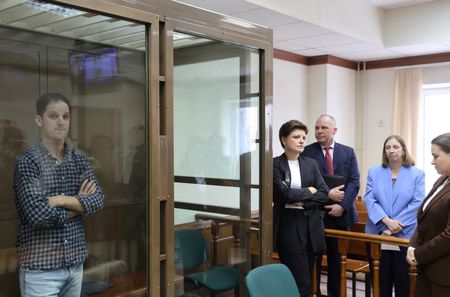 1
1 1
1
By Humeyra Pamuk and Daphne Psaledakis
WASHINGTON (Reuters) -The United States on Thursday imposed sanctions on Russia’s domestic security service FSB and the intelligence unit of Iran’s Revolutionary Guard Corps (IRGC) accusing them of being responsible or complicit in the wrongful detention of Americans overseas.
The sanctions also targeted four senior commanders within IRGC’s IO, although among them were at least one individual who had been already been subject to previous U.S. sanctions. FSB, which was targeted because officials said it was involved in the detention of at least one U.S. citizen whose name was not disclosed, was also subject to previous U.S. sanctions.
Speaking to reporters in a briefing call on the condition of anonymity, senior Biden administration officials said Thursday’s move aimed to show that there would be consequences for those who tried to use U.S. citizens for political leverage or seek concessions from Washington.
“Our actions are a clear and direct warning to those around the world who wrongfully detain U.S. nationals of the potential consequences of their actions,” U.S. Secretary of State Antony Blinken said in a statement.
The move, the U.S. officials said, aimed to promote accountability, and by doing so prevent and deter further politically motivated detentions of Americans abroad. He added Thursday’s sanctions were just the beginning and that there was possibly more to come.
Russia and Iran, two U.S. adversaries, hold a number of American citizens in their prisons, detentions Washington says are wrongful and politically charged.
Last month, Russia’s FSB arrested Evan Gershkovich, a U.S. reporter working for the Wall Street Journal and accused him of espionage, a charge he has denied. Paul Whelan, a former U.S. Marine, has also been serving a 16-year jail sentence in a Russian penal colony over spying accusations. He denies any wrongdoing.
Ties between the United States and Russia have sunk to their worst in decades following Moscow’s invasion of Ukraine, however the two former Cold War foes have managed to carry out compartmentalized diplomacy which resulted in two prisoner swaps last year.
In one, Washington has secured the release of U.S. basketball star Brittney Griner who was held in Russia on drug charges, by commuting the sentence of Russian arms dealer Viktor Bout.
The plight of Americans detained by foreign governments has moved into the spotlight with Griner’s case. Although the U.S. government does not provide figures, there are more than 60 such detainees, according to the James Foley Foundation, named after an American journalist abducted and killed in Syria.
At least several of them are jailed in Iran.
(Reporting by Humeyra Pamuk and Daphne Psaledakis, Editing by Nick Zieminski)